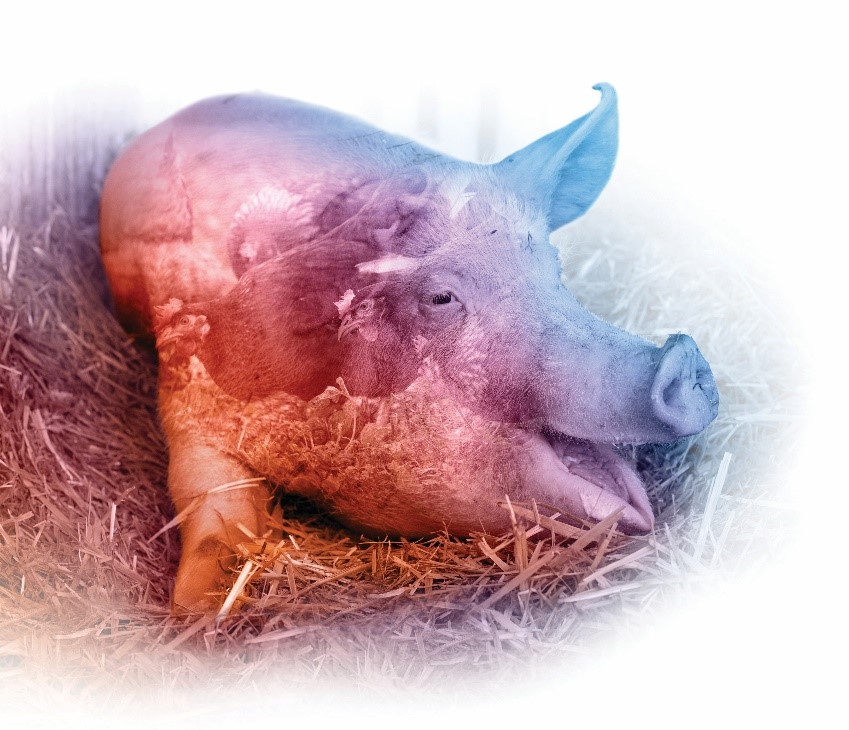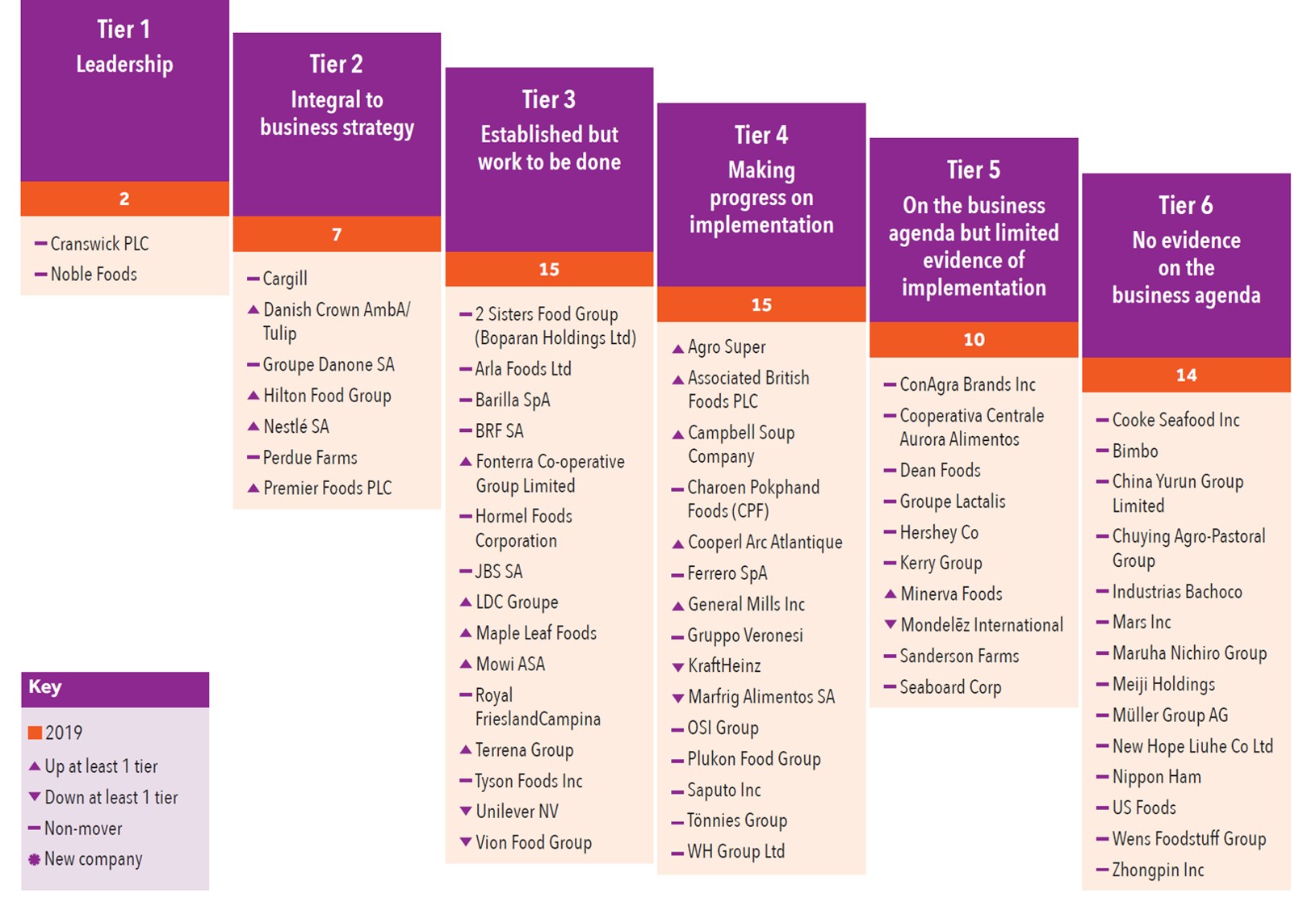



Producers and processors in the top tier of the 2020 Business Benchmark on Farm Animal Welfare
The Business Benchmark on Farm Animal Welfare (BBFAW), the leading global measure of policy commitment, performance and disclosure on animal welfare in food companies, has launched its eighth annual report today revealing that two of the six companies in the top Tier are producers or manufacturers.The 2019 Benchmark, which analysed 150 global food companies and is supported by Compassion in World Farming and World Animal Protection sees Cranswick and Noble Foods recognised as global leaders on farm animal welfare, alongside retailers Marks & Spencer, Waitrose, Co-op Group (Switzerland) and Migros.
Beyond the individual company rankings, the 2019 Benchmark reports that 60 of the world’s leading food companies now have formal farm animal welfare policies and appropriate management processes for ensuring they are effectively deployed internally and throughout their supply chains. It cites consumer interest in farm animal welfare, coupled with positive momentum inside a majority of the world’s most influential food companies as key accelerators of year on year change. However, it warns that progress is still too slow with 40 percent of the 150 companies still appearing in the bottom tiers, providing little or no information about how they are managing the risks and opportunities associated with farm animal welfare.
Nicky Amos, Executive Director of the Business Benchmark on Farm Animal Welfare, said: “The 2019 findings demonstrate that the BBFAW continues to be an important driver of change. An increasing number of companies are using the annual benchmark to drive continuous improvement in farm animal welfare practices, performance and disclosure. However, it is clear there is a great deal more to do if farm animal welfare is to become institutionalised across the global food industry.”
She continued: “In 2019, the rise in consumer and investor interest, coupled with increasing pressure on suppliers from food companies signals a ‘perfect storm’ for moving the dial on farm animal welfare. The BBFAW’s 2019 company and investor surveys tell us that customer interest in animal welfare is the primary driver for business action for 79 percent of companies, while 82 percent of investors consider animal welfare to be an investment risk. Companies that fail to take responsibility for ensuring the welfare of animals farmed for food can expect heightened scrutiny from their business customers and partners, from investors, and from consumers.”


The report shows that the UK continues to lead the global food industry on farm animal welfare management, reporting and performance. UK companies achieved an average score of 64 percent compared to 40 percent for companies in Europe (excluding the UK) and 34 percent for all companies covered by the Benchmark, up from 32 percent in 2018.
In total, 63 Producers & Manufacturers with combined revenues of US$500 billion were assessed in this year’s report, together with 52 Retailers & Wholesalers and 35 Restaurants & Bars. Interestingly, both the Producer and Retailer sectors improved their average overall scores to 35 percent (from 31 percent and 32 percent respectively in 2018), while the Restaurants & Bars sector score has remained static at 32 percent. It is worth noting, however, that the Restaurants & Bars sector has historically lagged behind the Retailer and Producer sectors but between 2017 and 2018 it managed to successfully close the gap.
In terms of tier movement, 15 companies in the Producers & Wholesalers sector moved up at least one tier, including Nestlé, Premier Foods, Associated British Foods, Danish Crown AmbA/Tulip, Terrena Group and Hilton Food Group, five moved down one tier and included Unilever, KraftHeinz and Mondelez International, and there were 43 non movers including Mars, Müller Group, Hershey Co, Perdue Farms and Groupe Danone. There were no new entries in this sector.
Magdi Batato, Executive Vice President, Head of Operations at Nestlé, commented on its move up to Tier 2: “We care about animal welfare and are committed to improving the way farm animals are treated. We are pleased to move up to Tier 2 in the Business Benchmark on Farm Animal Welfare index this year. This recognises our efforts to improve transparency and reporting on our progress. We will continue to work with others in the food industry to make further improvements.”
Cranswick and Noble Foods have performed well over the years both regularly appearing in the top tier, justifying their reputation as global leaders in farm animal welfare, particularly within the Producers & Manufacturers sector. Noble Foods, the UK’s largest egg supplier, is a business driven by innovation and a determination to consistently improve farm animal welfare. This ethos has led to the company’s commitment to producing 100 percent cage-free eggs by 2025.
Danish Crown’s ascent to Tier 2 can be partly attributed to the publication of its Animal Welfare Policy, which also includes reporting on progress and welfare outcome measures. Furthermore, the company’s Danish, UK, Swedish and German supply chains must source from producers that are accredited to recognised animal welfare schemes including Danish Product Standard, Danish UK Contract, Red Tractor and RSPCA Assured and QS.’ The Report details how this policy is successfully applied within the business.
Hilton Food Group also moved up a tier into Tier 2. This was largely down to more detailed information on objectives and targets being provided, as well as better reporting on progress and trends in performance, such as addressing the issue of close confinement by not allowing sow stalls to be used. There was clarification on how animal welfare is included into contractual obligations for suppliers, and evidence of improved communication to consumers.
Nigel Edwards, Group CSR Director, Hilton PLC, explained their approach: “At Hilton Food Group we partner with our suppliers that lead in animal welfare as it is important to us, our retail partners and their customers. Our approach is to partner with experts ensuring our actions are led by science. We appreciate that our efforts and transparency were recognised as we progressed to Tier 2 in BBFAW this year, building on our highest new entrant in the ranking last year.”
The Benchmark is a long-term change initiative which is showing definite signs of progress. Of the 55 food companies that have been continuously benchmarked since 2012, 44 (80 percent) have moved up at least one tier. Further analysis shows that of these, 14 (25 percent) have moved up one tier, 18 (33 percent) have moved up two tiers and 12 (22 percent) have moved up three tiers. Furthermore, the average score for these trend companies has improved from 25 percent in 2012 to 50 percent in 2019; the average for all companies in 2019 is 34 percent. These improvements are even more striking given the tightening of the Benchmark criteria over time and these companies should be congratulated.


The Benchmark is increasingly recognised and quoted as THE measurement of farm animal welfare standards by the world’s leading food businesses and is respected by financial investors as a trustworthy authority. There is still much work to be done, but there appears to be both an appetite and a willingness for change within the food industry, the financial sector and crucially amongst consumers who remain a key driving force behind it.
Philip Lymbery, Global CEO at Compassion in World Farming, commented: “For the last eight years, the Benchmark has been instrumental in encouraging global food businesses to adopt new policies on farm animal welfare. Now, the onus is on companies demonstrating strong performance to implement these policies, by for example, making sure that cage-free systems are fit for purpose and delivered in a timely fashion.”










